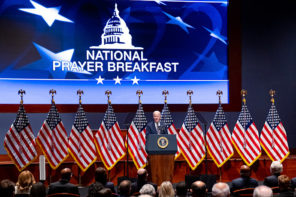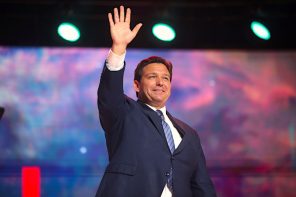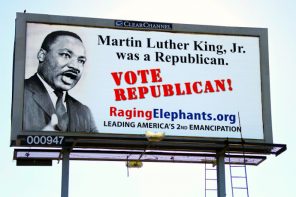As I reported yesterday, the religious right is framing the repeal of Don’t Ask, Don’t Tell as an infringement of Christians’ religious freedom, and is vowing to “protect” the “religious liberty” of chaplains and other servicemembers who claim that serving with gays and lesbians violates their rights.
This is the next front in the religious right’s military culture war, in which it has promoted overt proselytizing by both chaplains and officers, and in the process, portrayed the US wars in Iraq and Afghanistan as epic confrontations between Christianity and Islam.
Now, with its military evangelists in place, the religious right is taking one of its civilian crusades — to paint homosexuality as a religious war between the equal rights of sexual minorities and the supposed “right” of “Christians” to preach against homosexuality — to the military.
At its core, the war against the “homosexual agenda” pits the rights of LGBT people against the “Christian nation” mythology. Since we are a Christian nation, the argument goes, our laws must reflect that Christian theology condemns homosexuality. Despite being on shaky ground both theologically and historically, religious right legal organizations — claiming the need to counter the ACLU and its advocacy for both LGBT rights and the separation of church and state — have attempted to transform this culture war argument into a legal one.
The most recent effort was in the Supreme Court case of Christian Legal Society v. Martinez, in which the CLS argued that Hastings Law School should grant it official recognition as a club, even though it required “members and those wishing to hold leadership positions in the club to be professing Christians and to disavow ‘unrepentant participation in or advocacy of a sexually immoral lifestyle,‘” in violation of the school’s non-discrimination policy.
Although CLS lost that case at the Supreme Court, it was one in a long line which have gradually morphed church-state separation cases into free speech cases — for Christians, that is. In other words, whereas courts used to determine whether religious action (such as use of public school resources for a Bible club) would constitute government endorsement of religion, religious right legal advocacy has altered the jurisprudence to evaluate such questions based on whether the school’s exclusion of the Bible club constitutes “viewpoint discrimination” or otherwise infringes on the religious liberty or free speech of Christians.
Religious right legal organizations have taken that argument — both in court and in the court of public opinion — to what Alliance Defense Fund president Alan Sears calls the “collision course” between Christianity and LGBT rights. They have made that argument in opposing same-sex marriage, the Employment Non-Discrimination Act, and hate crimes legislation. And even when these advocacy groups don’t prevail in court or in the legislature — as when they failed to stop repeal of DADT — they make a proverbial federal case out of it anyway.
In a September 2010 letter [PDF] to President Obama opposing DADT repeal, a group of retired military chaplains cited the loss of the Hastings case as an example of how “Christian voluntary organizations have been discriminated against by governmental entities for requiring organizational leadership to share their religious beliefs on homosexual behavior.”
ADF counsel Daniel Blomberg, the group’s main spokesperson on the DADT issue, recently argued that DADT repeal could lead to gay or lesbian servicemembers filing complaints for harassment or discrimination:
(1) unclearly defined regulatory boundaries will push chaplains toward self-censorship to avoid even specious complaints, (2) the proposed complaint resolution system—where the local chain of command resolves complaints on an ad hoc basis—could worsen that chill on religious speech by having inconsistent applications of unclear rules, and (3) even where a complaint is dismissed, the investigation process itself can create pressure to avoid religious teachings on sexual ethics to avoid being branded as a “troublemaker” or seen as “not a team player.” And given that commanders can be criminally punished for failure to prosecute sexual orientation discrimination or harassment complaints, there’s a significant likelihood that even baseless complaints will be exhaustively investigated.
This is only a few steps away from specious arguments that LGBT equality “criminalizes” Christianity. The reality in the military is that nontheists, Jews, Muslims, and even Christians who aren’t evangelical are subject to the imposition of evangelical religious belief, all funded by the US government.
In their letter to the president, however, the retired chaplains exposed their real goal (in addition to depriving gays and lesbians of equal rights): to fuse not only church and state, but church and military. Repealing DADT, they maintained, would force chaplains to choose between “whether they are to obey God or to obey men.” They protested that if DADT were to be repealed (or, in their words, if “homosexual behavior” were to be “normalized” in the military), then, among other things, “homosexual couples” would seek to participate in a military-sponsored marriage counseling program, Strong Bonds. “The religious beliefs of many chaplains involved in the program,” the letter read, “would not allow them to support relationships that are both harmful and sinful.”
Two years ago, I met Major Laurel Williams, who had served in the Army since 1985, but noticed a distinct change in the religious environment around 2005, when there was a highly noticeable uptick in the number of services, prayer breakfasts, emails from chaplains, displays of crosses, and other evangelical activity that struck her as “excessive.” But what bothered Major Williams most was the Strong Bonds program, which she attended at an Orlando hotel in January 2008.
Included in the Strong Bonds conference tote bag was a camouflage box with a New Life Ministries inscription; a Life Recovery Bible; Every Woman’s Battle by Shannon Etheridge; Five Love Languages, by Gary Chapman, described as the “leading biblical marriage counselor in the US and whose exhortation to “love your partner like Jesus loved the church was repeated over and over throughout the weekend seminar,” said Williams. One book promised that after reading it, “you can be equipped to develop an affair with the one and only lover who can satisfy all your innermost desires: Jesus Christ.”
The Secular Coalition for America and the Military Religious Freedom Foundation have both raised constitutional concerns about Strong Bonds. But the retired chaplains’ complaint — that they would be forced to teach marriage-strengthening classes to gay and lesbian people — is a prime example of the “collision course” the religious right has created between the separation of church and state and the evangelizing culture.




